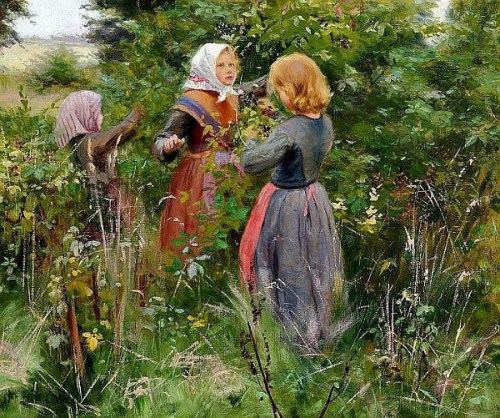
MYRA'S FRIEND.
"MYRA LAMBERT, I am ashamed of you!" exclaimed Louis.
"Nonsense! Louis Lambert, you are a proud, disagreeable fellow!" cried Myra.
"What does this mean? I never heard you speak so unkindly to each other before," said Cousin Lily, running into the library and looking with some alarm at the excited faces.
"Oh," began Louis, "Myra makes friends with such queer people out here. Why, Cousin Lily, I actually saw her kiss that little girl that picks berries for you; besides, she asked her to come to see us when she goes to market in the autumn."
"Well, Molly is a sweet little girl," cried Myra.
"She picks berries to help her lame mother, you know, and she tries hard to study between-times.
When she comes to town, I mean to give her a lunch and some of my storybooks. I am sure that mother will be willing."
"But how would it look to see Myra kiss that girl in our hall? Suppose that some of the school-girls should run in just then?" said Louis.
"I wouldn't care," said Myra. "Molly is just as good as any of them. Some day she'll be a real fine women."
"I don't doubt it," said Cousin Lily warmly.
"Myra is right about Molly's kindness to her mother. She is as busy as a bee, too; she will learn more than many a girl who goes to a fine school. I really cannot understand, Louis, why it should be a disgrace for the girls to see her in your hall."
"Oh, she is nothing but a berry-picker," said Louis, who felt, though, that there was no use in arguing with Cousin Lily.
"The question is, How does she pick her berries?"
"With her might," said Myra warmly. "She studies geography with all her might, too. She sweeps the cottage and makes toast and tea in the same way; she is what mother calls an 'energetic' girl at everything."
"Indeed!" said Cousin Lily. "I don't doubt that she will grow up to be a fine woman. I see no reason why you should be ashamed of her as a friend. All this reminds me of a story that I read."
"A real true story?" asked Louis.
"Yes. A lawyer in an English court was pleading with great eloquence for his client; there was scarcely a doubt that he would win the case. The lawyer on the other side was a very haughty man, the son of a nobleman; he called out in an insulting tone to his opponent, Who are you? Why, you were once a poor boy; I remember when you used to black my father's boots.'
"'Indeed,' was the reply."' Well, what of that?
I trust that I blacked them well.'
"Remember," continued Cousin Lily, "that it is not so important what one does—if the work be a right one—as how one does it. It is what persons are, rather than the outward things that they possess, that makes the true boy or girl, the real man or woman."
S. S. Visitor.